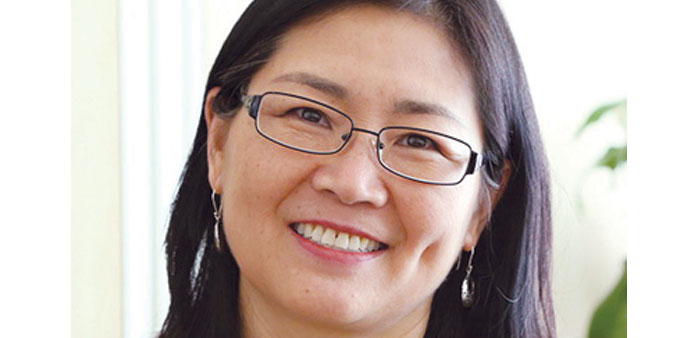|
Qatar Foundation’s Sidra Medical and Research Centre yesterday announced the publication of a study in the journal Cell, looking into factors which predict the way people respond to vaccination. |
Sidra’s chief research officer Dr Francesco Marincola and Translational Medicine division chief Ena Wang took part in the study, which identified that age, genetics and environmental factors may all play a role in determining the way the immune system reacts to vaccination.
Immunotherapy, a treatment which uses the body’s own immune system to treat or prevent disease, is a key area of research for Sidra and the study published in Cell is one of several recent advances in understanding the human immune system in normal and pathogenic (disease-causing) conditions.
In the study, healthy volunteers were immunised with the 2009 seasonal influenza vaccine and the 2009 H1N1 pandemic influenza vaccine, both of which have been widely used. The study was carried out on 63 of the volunteers and identified both the baseline characteristics of vaccine-induced coherent changes as well as individual heterogeneity (before vaccination) in response to the vaccination.
“Vaccination is one of the most powerful tools we have in the fight against disease, so understanding how different factors can affect the efficacy of vaccines is very important,” said Dr Wang.
“This study shows that there are significant variations among healthy individuals in response to a given vaccine at molecular, cellular and protein level and determining the existing baseline of an individual’s immune status is a strong predictor of his or her response to vaccination. Understanding these factors is key to developing our understanding of the immune system and the ways in which we can harness it to prevent and treat disease.”
Vaccination prevents debilitating illness and disability and saves millions of lives every year. To prepare the immune system for a particular disease, a vaccine will typically contain an agent that resembles a disease-causing microorganism which causes the immune system to react as if it’s fighting off disease without introducing its harmful properties into the system.
The agent stimulates the body’s immune system to recognise the agent as foreign, destroy it, and “remember” it, so that the immune system can more easily recognise and destroy these microorganisms in the future when it encounters the same pathogens.
Dr Wang joined Sidra in February this year to lead the Division of Translational Research from the National Institutes of Health in the US, where she was acting chief of the Infectious Disease and Immunogenetics Section, as well as associate director of Trans NIH Centre for Human Immunology.
Discussing the implications of the study, she said: “Overall, the study provides a potential resource for understanding how the immune system response to vaccines varies depending on physiological conditions. The findings can function as a reference hub for pathologic conditions, such as autoimmune disorder, cancer immunotherapy and transplant rejection. With in-depth understanding of how the immune system functions in diverse conditions and in different individuals, we could, ultimately, be able to adapt a patient’s immune system and deliver personalised medicines for every individual.”
630 young professionals attend Shell leadership programme
|
M |
ore than 630 youth leaders from at least 15 countries benefited from a “Leadership Engagement Session” organised by the Shell Young Professional Network in Qatar (YPN-Q), the company said.
The leadership session, which was facilitated by Upstream International director (Shell) Andy Brown, also included participants from other countries such as Egypt, Oman, Saudi Arabia, the United Arab Emirates, Jordan and Kuwait.
Qatar Shell media relations manager Ali Reyad al-Ansari said in a statement that “young professionals from around the Mena region had the opportunity to engage in a dialogue with Brown about current topics that affect their careers.”
He added the session focused on Shell’s global business priorities and career employment opportunities in the Middle East “and how to progress Shell’s ‘diversity and inclusion agenda,’ especially addressing the needs of young female professionals.”
“The objective of the leadership engagement sessions,” according to al-Ansari, “is to offer young professionals access to senior management by giving greater strategy insights, allowing participants to get answers directly from sources, and inspire young professionals to become the future leaders of Shell.”
He added that discussion between young professionals and senior leadership is part of Qatar Shell’s “Leaders Developing Leaders” programme.
“All leaders in the company are encouraged to use all tools at their disposal, including mentoring and coaching to develop their colleagues and especially the next generation of leaders in the organisation,” al-Ansari said.
Noura al-Kaabi, who was among the participants, said: “I think it’s always great to see senior leaders engaging with young professionals. Andy (Brown) demonstrated humility; he was open and honest with us.”
“I believe for us as young professionals, it’s always important to see the challenges our senior leaders are going through to make the company cutting edge in innovation and creativity. I believe this is a key to our sustainable development,” al-Kaabi added.
Brown, who led Shell’s business in Qatar for nearly a decade, acknowledged during the session the “immense progress” that has taken place over the past 10 years in Qatar.
Al-Ansari said: “Shell has invested over $20bn in Qatar to build a highly material business. As the largest international investor in the country, Shell is committed to delivering long-term value for Qatar and Shell for decades to come by developing people and delivering sustainable projects.”
He added that Qatar Shell aims “to become the employer of choice for Qataris.”
“This is demonstrated by employing and developing Qatari staff at all levels throughout the organisation, which is one of the main pillars of the Qatar’s National Vision 2030: developing human capital,” he explained.

